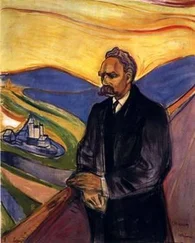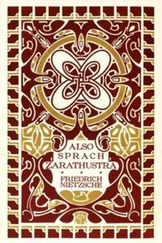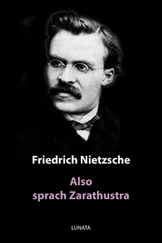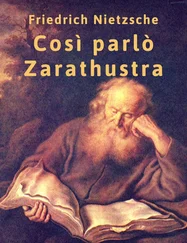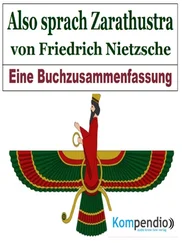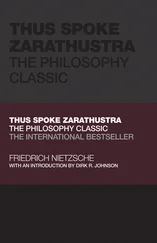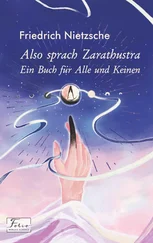Friedrich Nietzsche
(Unabridged)
Philosophical Novel Translator: Thomas Common
Published by
 Books
Books
Advanced Digital Solutions & High-Quality eBook Formatting
musaicumbooks@okpublishing.info2017 OK Publishing ISBN 978-80-7583-241-2
Introduction by Mrs Förster-Nietzsche. How Zarathustra Came into Being.
Thus Spoke Zarathustra. First Part.
Zarathustra’s Prologue.
Zarathustra’s Discourses.
1. The Three Metamorphoses.
2. The Academic Chairs of Virtue.
3. Backworldsmen.
4. The Despisers of the Body.
5. Joys and Passions.
6. The Pale Criminal.
7. Reading and Writing.
8. The Tree on the Hill.
9. The Preachers of Death.
10. War and Warriors.
11. The New Idol.
12. The Flies in the Market–Place.
13. Chastity.
14. The Friend.
15. The Thousand and One Goals.
16. Neighbour–Love.
17. The Way of the Creating One.
18. Old and Young Women.
19. The Bite of the Adder.
20. Child and Marriage.
21. Voluntary Death.
22. The Bestowing Virtue.
Second Part.
23. The Child with the Mirror.
24. In the Happy Isles.
25. The Pitiful.
26. The Priests.
27. The Virtuous.
28. The Rabble.
29. The Tarantulas.
30. The Famous Wise Ones.
31. The Night–Song.
32. The Dance–Song.
33. The Grave–Song.
34. Self–Surpassing.
35. The Sublime Ones.
36. The Land of Culture.
37. Immaculate Perception.
38. Scholars.
39. Poets.
40. Great Events.
41. The Soothsayer.
42. Redemption.
43. Manly Prudence.
44. The Stillest Hour.
Third Part.
45. The Wanderer.
46. The Vision and the Enigma.
47. Involuntary Bliss.
48. Before Sunrise.
49. The Bedwarfing Virtue.
50. On the Olive–Mount.
51. On Passing–by.
52. The Apostates.
53. The Return Home.
54. The Three Evil Things.
55. The Spirit of Gravity.
56. Old and New Tables.
57. The Convalescent.
58. The Great Longing.
59. The Second Dance–Song.
60. The Seven Seals.
Fourth and Last Part.
61. The Honey Sacrifice.
62. The Cry of Distress.
63. Talk with the Kings.
64. The Leech.
65. The Magician.
66. Out of Service.
67. The Ugliest Man.
68. The Voluntary Beggar.
69. The Shadow.
70. Noontide.
71. The Greeting.
72. The Supper.
73. The Higher Man.
74. The Song of Melancholy.
75. Science.
76. Among Daughters of the Desert.
77. The Awakening.
78. The Ass–Festival.
79. The Drunken Song.
80. The Sign.
Introduction by Mrs Förster-Nietzsche.
How Zarathustra Came into Being.
Table of Contents
“Zarathustra” is my brother’s most personal work; it is the history of his most individual experiences, of his friendships, ideals, raptures, bitterest disappointments and sorrows. Above it all, however, there soars, transfiguring it, the image of his greatest hopes and remotest aims. My brother had the figure of Zarathustra in his mind from his very earliest youth: he once told me that even as a child he had dreamt of him. At different periods in his life, he would call this haunter of his dreams by different names; “but in the end,” he declares in a note on the subject, “I had to do a Persian the honour of identifying him with this creature of my fancy. Persians were the first to take a broad and comprehensive view of history. Every series of evolutions, according to them, was presided over by a prophet; and every prophet had his ‘Hazar,’— his dynasty of a thousand years.”
All Zarathustra’s views, as also his personality, were early conceptions of my brother’s mind. Whoever reads his posthumously published writings for the years 1869–82 with care, will constantly meet with passages suggestive of Zarathustra’s thoughts and doctrines. For instance, the ideal of the Superman is put forth quite clearly in all his writings during the years 1873–75; and in “We Philologists”, the following remarkable observations occur:—
“How can one praise and glorify a nation as a whole?—Even among the Greeks, it was the individuals that counted.”
“The Greeks are interesting and extremely important because they reared such a vast number of great individuals. How was this possible? The question is one which ought to be studied.
“I am interested only in the relations of a people to the rearing of the individual man, and among the Greeks the conditions were unusually favourable for the development of the individual; not by any means owing to the goodness of the people, but because of the struggles of their evil instincts.
“ With the help of favourable measures great individuals might be reared who would be both different from and higher than those who heretofore have owed their existence to mere chance . Here we may still be hopeful: in the rearing of exceptional men.”
The notion of rearing the Superman is only a new form of an ideal Nietzsche already had in his youth, that “ The object of mankind should lie in its highest individuals ” (or, as he writes in “Schopenhauer as Educator”: “Mankind ought constantly to be striving to produce great men—this and nothing else is its duty.”) But the ideals he most revered in those days are no longer held to be the highest types of men. No, around this future ideal of a coming humanity—the Superman—the poet spread the veil of becoming. Who can tell to what glorious heights man can still ascend? That is why, after having tested the worth of our noblest ideal—that of the Saviour, in the light of the new valuations, the poet cries with passionate emphasis in “Zarathustra”:
“Never yet hath there been a Superman. Naked have I seen both of them, the greatest and the smallest man:—
All-too-similar are they still to each other. Verily even the greatest found I— all-too-human!”—
The phrase “the rearing of the Superman,” has very often been misunderstood. By the word “rearing,” in this case, is meant the act of modifying by means of new and higher values—values which, as laws and guides of conduct and opinion, are now to rule over mankind. In general the doctrine of the Superman can only be understood correctly in conjunction with other ideas of the author’s, such as:— the Order of Rank, the Will to Power, and the Transvaluation of all Values. He assumes that Christianity, as a product of the resentment of the botched and the weak, has put in ban all that is beautiful, strong, proud, and powerful, in fact all the qualities resulting from strength, and that, in consequence, all forces which tend to promote or elevate life have been seriously undermined. Now, however, a new table of valuations must be placed over mankind—namely, that of the strong, mighty, and magnificent man, overflowing with life and elevated to his zenith—the Superman, who is now put before us with overpowering passion as the aim of our life, hope, and will. And just as the old system of valuing, which only extolled the qualities favourable to the weak, the suffering, and the oppressed, has succeeded in producing a weak, suffering, and “modern” race, so this new and reversed system of valuing ought to rear a healthy, strong, lively, and courageous type, which would be a glory to life itself. Stated briefly, the leading principle of this new system of valuing would be: “All that proceeds from power is good, all that springs from weakness is bad.”
Читать дальше

 Books
Books